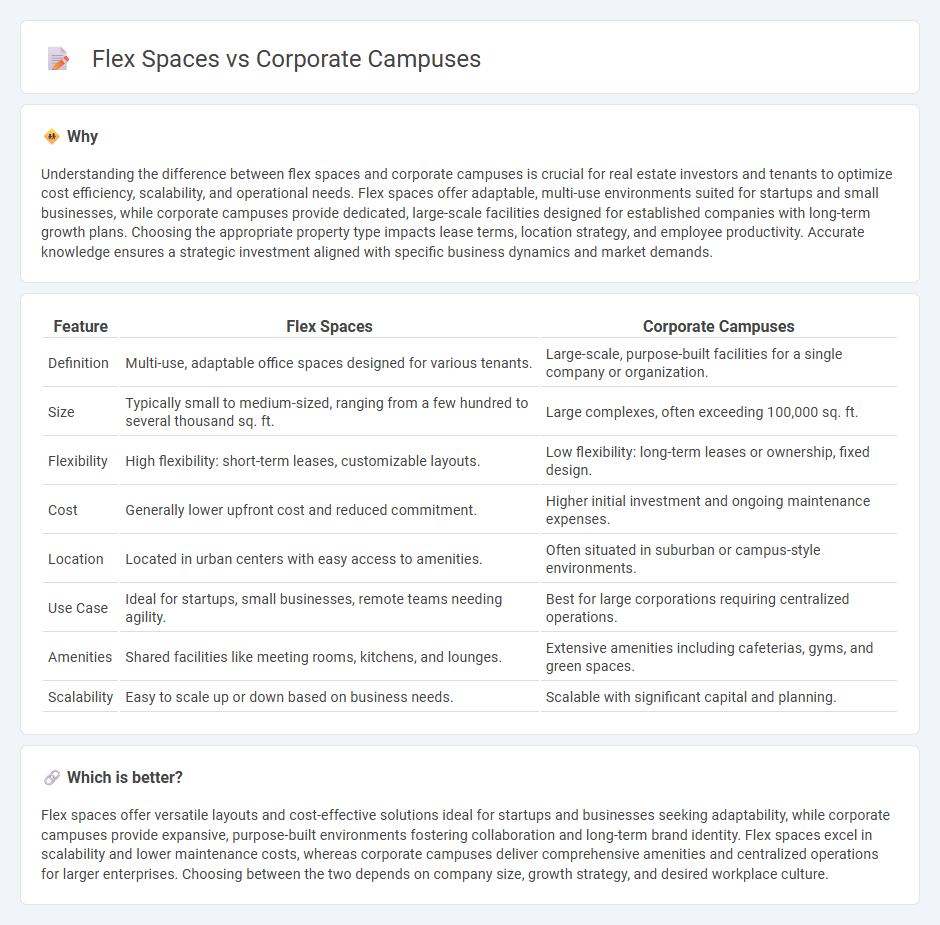
Flex spaces offer adaptable work environments designed to meet the dynamic needs of modern businesses, featuring modular layouts and scalable amenities. Corporate campuses provide expansive, purpose-built facilities that support large teams with integrated infrastructure and extensive on-site resources. Explore how these real estate solutions can optimize your organization's productivity and growth strategy.
Why it is important
Understanding the difference between flex spaces and corporate campuses is crucial for real estate investors and tenants to optimize cost efficiency, scalability, and operational needs. Flex spaces offer adaptable, multi-use environments suited for startups and small businesses, while corporate campuses provide dedicated, large-scale facilities designed for established companies with long-term growth plans. Choosing the appropriate property type impacts lease terms, location strategy, and employee productivity. Accurate knowledge ensures a strategic investment aligned with specific business dynamics and market demands.
Comparison Table
| Feature | Flex Spaces | Corporate Campuses |
|---|---|---|
| Definition | Multi-use, adaptable office spaces designed for various tenants. | Large-scale, purpose-built facilities for a single company or organization. |
| Size | Typically small to medium-sized, ranging from a few hundred to several thousand sq. ft. | Large complexes, often exceeding 100,000 sq. ft. |
| Flexibility | High flexibility: short-term leases, customizable layouts. | Low flexibility: long-term leases or ownership, fixed design. |
| Cost | Generally lower upfront cost and reduced commitment. | Higher initial investment and ongoing maintenance expenses. |
| Location | Located in urban centers with easy access to amenities. | Often situated in suburban or campus-style environments. |
| Use Case | Ideal for startups, small businesses, remote teams needing agility. | Best for large corporations requiring centralized operations. |
| Amenities | Shared facilities like meeting rooms, kitchens, and lounges. | Extensive amenities including cafeterias, gyms, and green spaces. |
| Scalability | Easy to scale up or down based on business needs. | Scalable with significant capital and planning. |
Which is better?
Flex spaces offer versatile layouts and cost-effective solutions ideal for startups and businesses seeking adaptability, while corporate campuses provide expansive, purpose-built environments fostering collaboration and long-term brand identity. Flex spaces excel in scalability and lower maintenance costs, whereas corporate campuses deliver comprehensive amenities and centralized operations for larger enterprises. Choosing between the two depends on company size, growth strategy, and desired workplace culture.
Connection
Flex spaces and corporate campuses are interconnected through their shared ability to accommodate evolving workforce needs and enhance operational efficiency. Flex spaces offer adaptable environments that support remote work, collaboration, and scalable office setups within the broader design of corporate campuses. This integration fosters innovation and agility, aligning with modern real estate trends focused on flexible occupancy and employee-centric workspaces.
Key Terms
Build-to-Suit
Corporate campuses offer customized build-to-suit solutions designed to meet specific business requirements, emphasizing long-term control and brand identity. Flex spaces provide modular, adaptable environments that support dynamic workforce needs but often lack the full customization of build-to-suit projects. Explore how build-to-suit strategies can optimize your corporate real estate investments.
Open Floor Plan
Corporate campuses with open floor plans foster collaboration and innovation by providing expansive, uninterrupted spaces tailored for team interaction and creativity. Flex spaces emphasize adaptability, offering modular designs that accommodate fluctuating team sizes and diverse workstyles within open layouts. Explore how choosing between corporate campuses and flex spaces with open floor plans can transform your organization's productivity and culture.
Adaptive Reuse
Adaptive reuse transforms old corporate campuses into flexible work environments, preserving architectural heritage while meeting modern business needs. Flex spaces offer scalability and dynamic layouts, enhancing collaboration and employee satisfaction. Explore how adaptive reuse shapes future workplaces to optimize space utilization and sustainability.
Source and External Links
Is a Corporate Campus Right for Your Business? - Corporate campuses offer operational benefits, custom-designed facilities, and a secure environment tailored to a company's specific needs, often improving business performance and employee culture.
15 COOLEST Corporate Headquarter Buildings - Large companies like Microsoft operate expansive corporate campuses that function like small cities, with millions of square feet, dozens of buildings, and amenities for tens of thousands of employees.
Corporate Headquarters: From the Inside Out - Modern corporate campuses are designed to foster collaboration, accommodate diverse work styles, and strengthen community connections among a global workforce, supporting cultural transformation and innovation.
 dowidth.com
dowidth.com